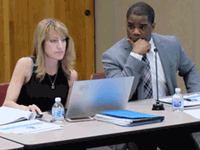[
{
"name": "500x250 Ad",
"insertPoint": "5",
"component": "15667920",
"parentWrapperClass": "",
"requiredCountToDisplay": "1"
}
]
I would so love to know what really goes on in the mind of Mitch McConnell. Anybody with any sense knows what's coming if we don't do something about climate change – quickly. And yet late last week, there was the Kentucky senator, helping lead the resistance.
This is the man who may very well be the next majority leader of the US Senate.
McConnell's target last week was a new World Bank declaration addressing one of the chief causes of climate change: carbon emissions. The declaration, which according to the New York Times has been signed "by 74 countries and more than 1000 businesses and investors," urges governments to require industries to pay for their carbon emissions – through a carbon tax, for instance.
Coal, of course, is one of the culprits, and McConnell represents a state where coal has been a huge industry. Nobody would suggest that he shouldn't be concerned about his state's economic interests. But he also ought to be concerned about the economic interests and the physical health of people around the world. He could do that by leading efforts to move his state's economic dependency away from coal.
Instead, he's helping the climate-change deniers, insisting that the people pressing for something like a carbon tax are "global elites." (This is nothing new; asked last spring whether he believes in climate change, he told the Cincinnati Enquirer: "I don't buy it.")
McConnell is not dumb. He has three college degrees, including one in law from the University of Kentucky. So he has to know what's happening.
Glaciers are melting. Sea levels are rising, and they'll eventually flood major coastal cities. Storms are becoming more intense. Droughts are longer. The oceans, which absorb some of the carbon dioxide in the atmosphere, are becoming more acidic, and that's destroying coral reefs. Wildlife is seeking new habitat. Scientists now predict that about half of the bird species in North America will move to different regions, and some will become extinct.
The Environmental Protection Agency projects that by the end of this century, the southeastern and southwestern United States will see temperatures with a high of more than 90 degrees for more than 150 days every year (compared to 60 now) – and the highs will be 10 degrees hotter than they are now. Those of us in the north will have colder, stormier winters.
And Elizabeth Ferris, a senior fellow at the Brookings Institution, writes that "one of the most far-reaching consequences of climate change is likely to be on the movement of people," with "hundreds of millions of people" displaced.
None of this is new – other than the pace of the change. It's faster than scientists had been predicting. But to watch the United States' response, you'd never know there's a problem.
Since Barack Obama became president, the federal government has expanded areas open to offshore drilling, weakened strip-mining regulations for Kentucky, and auctioned leases for coal extraction from public land in Wyoming. The push continues for more hydrofracking (and I'd bet that Governor Cuomo will join it right after next month's election). If the Republicans win control of the Senate this year, approval of the Keystone Pipeline looks like a certainty.
In his United Nations speech about climate change last week, President Obama bragged about the reduction in "our total carbon pollution." But Europe has cut carbon emissions more than we have – and after a dip in US emissions, apparently due to the recession, ours went back up in 2013.
Coal consumption is down – in this country. But at the same time that we urge other countries to cut back on their pollution, we're shipping a substantial amount of coal abroad, making money off of the international pollution. And we're becoming a major oil exporter.
The US, as environmental activist Bill McKibben puts it, is "a global-warming machine."
"At the moment when physics tells us we should be jamming on the carbon brakes," McKibben wrote in Rolling Stone late last year, "America is revving the engine."
Not everybody is waiting for the climate deniers to get out of the way. One hundred eighty US institutions, organizations, and governments have promised to sell their fossil-fuel investments. Significantly, the Rockefeller Brothers Fund joined that movement in late September.
Forty companies have pledged to help end deforestation in tropical regions. And other companies, including tech giants Apple, Google, and Facebook, are already working on getting their power from renewable sources like solar. Apple has built a solar plant in North Carolina to power one of its operations.
What we have, then, is the struggle for the health of the planet being led by individual environmentalists marching in the streets, by underfunded environment non-profits, by individual businesses and institutions, and by a handful of states (California, predictably, among them but not, alas, the "progressive" state of New York).
This is an intellectual issue, with an anti-intellectual, anti-science sentiment helping sway public policy in a country whose citizens say they value education.
It's also a democracy-for-sale issue. A study by the Tampa Bay Times' Politifact found that only eight out of the 278 Republican members of Congress have been willing to go on record as accepting the fact that people are causing global warming. There could be more than eight: not all Republicans have taken a public stand on the issue. But that in itself is stunning.
Like Mitch McConnell, most of these people are not stupid. So what's getting in the way of science and concern about the future of the planet? The fossil-fuel industry's money.
Above all, this is a moral issue. Fighting climate change – putting the United States at the lead in fighting climate change – shouldn't be a hard call for politicians; they're certainly not shy in speaking out against terrorism.
For industries to put their own financial gains above the needs of the world's people is callous. But for politicians like Mitch McConnell to give in to them? I'm not sure what the best word is.
Speaking of...
Latest in Urban Journal
More by Mary Anna Towler
-

Police reform: advocates on what should come next
Oct 22, 2019 -

Court clears the way for Police Accountability referendum
Oct 17, 2019 -

Dade outlines initial actions on district deficit
Oct 9, 2019 - More »







